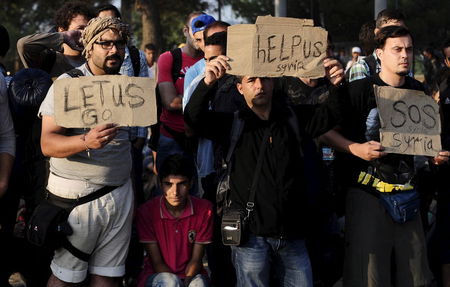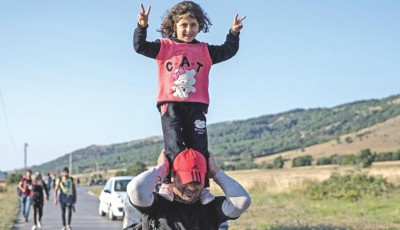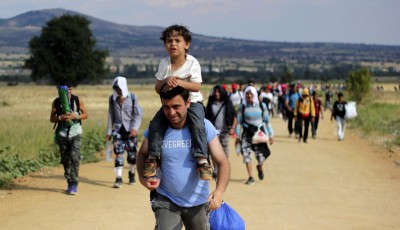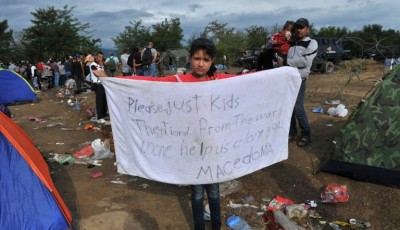Macedonian troops fire stun grenades at migrants on border
Some 800,000 refugees are expected in Germany this year alone, by far the most in the 28-nation European Union.
Migrants rest while waiting to pass the Greek-Macedonian border, guarded by Macedonian police near the town of Idomeni, northern Greece, on August 21, 2015.
Although, the use of tear gas and stun grenades may not be in place elsewhere, the heavy-handed approach taken by the authorities is something used throughout Europe to combat the migrant crisis.
Holding his child, a man pleaded for help. “Why won’t they let us through here?” he asked.
Security forces beat back the migrants with truncheons and riot shields, and people fainted in the ensuing crushes.
Police in riot gear fired tear gas and stun grenades, sending up clouds of smoke, as hundreds of migrants, including women and children, gathered at the border fence. Some were injured as they fell to the ground; one youth’s face was covered in blood. “I don’t have passport or identity documents. This is why I want to go to Germany to work and live like a human being”, says Abdul, from Pakistan. “I will stay here till the end”. “The shocking scenes today are a result of extreme measures to prevent desperate people fleeing violence and war from crossing borders”.
Prime Minister Nikola Gruevski of Macedonia said that the state of emergency was a “temporary mechanism” meant to control the flow of migrants “so that they will have more humane transport through Macedonia“.
With only three small trains per day coming in the train station, not all of the migrants would be able to board them.
“A limited number of illegal migrants in vulnerable categories are allowed to enter Macedonia and they may be provided with aid in accordance with the state’s capacities”, the interior ministry said in a statement.
From there, they planned to catch trains that would take them to the Serbian border and on to Hungary, where they would benefit from Europe’s borderless Schengen zone.
At least 39,000 refugees, mostly Syrians, were registered transiting Macedonia – twice as many as during the previous month.
While many migrants make it through to northern Europe, many others are left stranded in non-EU countries like Macedonia and Serbia, adding extra pressure to both asylum seekers and the countries that in many cases are unable to handle the influx of people.
Military patrols were deployed overnight, the Plus Info website said.
Dimitris Avramopoulos, the EU’s Migration and Home Affairs Commissioner, insisted the commission had been working “day and night” to offer funding and other support to states struggling to cope with the influx of migrants from the Middle East, Africa and South Asia. That doesn’t include hundreds more who have reached the islands on their own. A vehicle ferry chartered by the Greek government picked up around 2,400 migrants from the islands of Kalymnos, Lyros, Kos, and Lesvos and landed near Athens Thursday, and the BBC reports that a new “welcome center” can handle less than half that number.
One of the Syrian passengers, Alan Jamil, said he was not aware Macedonia had closed its border but would find a way out of Greece.












